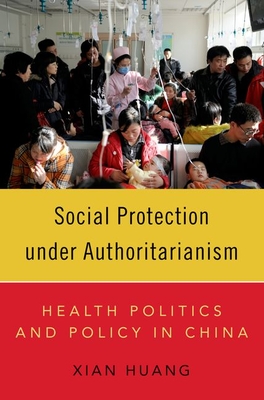Social Protection Under Authoritarianism: Health Politics and Policy in China

Social Protection Under Authoritarianism: Health Politics and Policy in China
Why would an authoritarian regime expand social welfare provision in the absence of democratization? Yet China, the world's largest and most powerful authoritarian state, has expanded its social health insurance system at an unprecedented rate, increasing enrollment from 20 percent of its population in 2000 to 95 percent in 2012. Significantly, people who were uninsured, such as peasants and the urban poor, are now covered, but their insurance is less comprehensive than that of China's elite. With the wellbeing of 1.4 billion people and the stability of the regime at stake, social health insurance is now a major political issue for Chinese leadership and ordinary citizens. In Social Protection under Authoritarianism, Xian Huang analyzes the transformation of China's social health insurance in the first decade of the 2000s, addressing its expansion and how it is distributed. Drawing from government documents, filed interviews, survey data, and government statistics, she reveals that Chinese leaders have a strategy of "stratified expansion," perpetuating a particularly privileged program for the elites while developing an essentially modest health provision for the masses. She contends that this strategy effectively balances between elites and masses to maximize the regime's prospects of stability. In China's multilevel governance, both centralized and decentralized structures are involved in the distribution of social health insurance. When local leaders implement the stratified expansion of social health insurance, they respond to varied local conditions. As a result, China's health insurance policies differ dramatically across subnational regions as well as socioeconomic groups. Providing an in-depth look into China's health insurance system, this book sheds light not only on Chinese politics, but also on how social benefits function in authoritarian regimes and decentralized multilevel governance settings.
Descrierea produsului
Why would an authoritarian regime expand social welfare provision in the absence of democratization? Yet China, the world's largest and most powerful authoritarian state, has expanded its social health insurance system at an unprecedented rate, increasing enrollment from 20 percent of its population in 2000 to 95 percent in 2012. Significantly, people who were uninsured, such as peasants and the urban poor, are now covered, but their insurance is less comprehensive than that of China's elite. With the wellbeing of 1.4 billion people and the stability of the regime at stake, social health insurance is now a major political issue for Chinese leadership and ordinary citizens. In Social Protection under Authoritarianism, Xian Huang analyzes the transformation of China's social health insurance in the first decade of the 2000s, addressing its expansion and how it is distributed. Drawing from government documents, filed interviews, survey data, and government statistics, she reveals that Chinese leaders have a strategy of "stratified expansion," perpetuating a particularly privileged program for the elites while developing an essentially modest health provision for the masses. She contends that this strategy effectively balances between elites and masses to maximize the regime's prospects of stability. In China's multilevel governance, both centralized and decentralized structures are involved in the distribution of social health insurance. When local leaders implement the stratified expansion of social health insurance, they respond to varied local conditions. As a result, China's health insurance policies differ dramatically across subnational regions as well as socioeconomic groups. Providing an in-depth look into China's health insurance system, this book sheds light not only on Chinese politics, but also on how social benefits function in authoritarian regimes and decentralized multilevel governance settings.
Detaliile produsului












